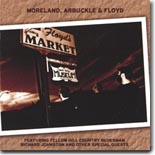 Moreland, Arbuckle and Floyd’s Floyd’s Market may not be a
masterpiece, but its damn close. Steeped in the Fat Possum / Fred
McDowell style of loud primal and bone chilling, the trio set an
impressive pace with the opening “Let It Ride,” on which Floyd (just
Floyd)’s drumming sets a metronomic pace next to the hypnotic drone of
Aaron Moreland’s guitar. Over these is the mic garbling vocals of Dustin
Arbuckle.
Moreland, Arbuckle and Floyd’s Floyd’s Market may not be a
masterpiece, but its damn close. Steeped in the Fat Possum / Fred
McDowell style of loud primal and bone chilling, the trio set an
impressive pace with the opening “Let It Ride,” on which Floyd (just
Floyd)’s drumming sets a metronomic pace next to the hypnotic drone of
Aaron Moreland’s guitar. Over these is the mic garbling vocals of Dustin
Arbuckle.
There are guest appearances on the disc from Richard Johnston (lowe bow,
guitar and vocals on “Long Past Midnight”), Dave Spindle of the Rounders
(bass on “So Low” and “Long Way Home”), Brian Seely (vocals on “Date
With the Devil”) and Steve Hatfield and Andy Gilstrap (both offering
drums and percussion on the perussive tour de force closer, “Meltdown”),
but this is largely just the work of three young visionaries with their
axes firmly planted in a rich juke joint and back porch tradition.
On “Fo” Moreland’s banjo and Floyd’s slap drums propel Arbuckle’s
vocalizing and harp playing on a tune that is a joyous romp. The
instrumental “Unsung,” besides being a cleverly titled tune, is a
beautifully played, albeit short, Moreland guitar showcase. The
spellbinding “So Low” is followed by an impressive take on Junior
Kimbrough’s “Meet Me In The City.” Variations on Juke” is a cool enough
harp blow by Arbuckle. “Date With the Devil” is a rat-a-tat romp that
allows the fellas to just tear it up, and tear it they do!
This is a killer trio that has crossover appeal if for no other reason
than that they are young and able to bring young blood to the blues with
their stripped down raw power. They sure tickle this old blues fans
ears, as well.
Did I say tickle? These guys rub it raw.
--- Mark E. Gallo
Love Money Can’t Buy, the most recent entry from Barbara Blue,
these days of Memphis, Tennessee, is a damned near flawless recording.
From the opening take on “Broken Hearts Row,” maybe the best single of
the year, through the killer take on Eddie Floyd’s rockin’ “On A
Saturday Night,” the rowdy original “Low Down Dirty Dawg,” an
appropriately primal rendition of Jessie Mae Hemphill’s “Standin’ In My
Doorway Cryin',” a gospel-drenched “What Makes You So Tough?” and the
jaw-dropping sinister blues of “Bag O’ Bones,” this is chock full of
blues that moves the soul and shakes the booty in equal measure.
Backed by the Phantom Blues Band, Taj Mahal’s usual partners in rhyme,
Blue sashays through more authoritative funky soul than anyone this side
of Delbert McClinton or Boz Scaggs with a voice that grabs the ears by
their lapel and shakes ‘em up, and then soothes them with the tones of
an angel, albeit one with a devilish streak. Johnny Lee Schell’s guitar
is mesmerizing, Mike Finnigan’s keyboard mastery is riveting and the
rhythm team of bassist Larry Fulcher and drummer Tony Braunagel is rock
steady. When the horn section of Lanny McMillan, Ben Cauley and Dedrick
Davis kicks in, this is unstoppable. This one is well worth trackin’
down. Whew! For more info, www.barbarablue.com.
--- Mark E. Gallo
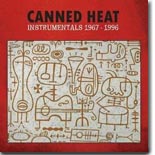 It’s always been a mystery why Canned Heat wasn’t a bigger deal
than they were. The ingredients were certainly in place for success.
Alan Wilson was an incredible harmonica player (who played on Son
House’s “rediscovery” album in the mid ’60s) and he also teamed with
Harry Vestine for some remarkable guitar work as well. Drummer Fito de
la Parra mixed boogie and R&B, along with a strong Latin flavor in his
sound, and frontman Bob “the Bear” Hite was a first-rate showman and
entertainer.
It’s always been a mystery why Canned Heat wasn’t a bigger deal
than they were. The ingredients were certainly in place for success.
Alan Wilson was an incredible harmonica player (who played on Son
House’s “rediscovery” album in the mid ’60s) and he also teamed with
Harry Vestine for some remarkable guitar work as well. Drummer Fito de
la Parra mixed boogie and R&B, along with a strong Latin flavor in his
sound, and frontman Bob “the Bear” Hite was a first-rate showman and
entertainer.
After a couple of excellent records in the late ’60s (including the
double album Hooker and Heat, which teamed the band with John Lee
Hooker), the bottom sort of dropped out for the band, due in large part
to the mysterious death of Wilson in 1970. Canned Heat continued in
various incarnations, but Hite passed away in 1981 and Vestine in 1997.
The band did continue touring through it all, with some familiar names
filling in the gaps over time (Walter Trout, Junior Watson, James
Thornberry, Robert Lucas).
Ruf Records has plunged into the Canned Heat archives to present the
impressive Instrumentals 1967-1996, a collection of all (or
mostly all) instrumental songs recorded during the band’s most active
period. Clocking in at over 70 minutes (15 tracks), it provides an
excellent overview of how talented and versatile Canned Heat was.
The earliest period of the band (1967-70, with Wilson, Vestine, Hite, de
la Parra, and bassist Larry Taylor) is featured on the first six tracks,
including the nearly 20-minute long “Parthenogenesis,” which is actually
nine very different pieces rolled into one package. Other highlights of
the early period include “Marie Laveau,” “Down In The Gutter But Free,”
which features some pretty awesome guitar pyrotechnics, and “Mi Huautia,”
a showcase for Wilson’s harp.
Three tracks cover the period following Wilson’s death, 1971 and 1972,
which saw the addition of Joel Scott Hill on guitar and Tony de la
Barreda on bass. “Hill Stomp” is aptly titled, while the funky “Don’t
Care What You Tell Me” features jazzman Charles Lloyd on flute.
There’s a big gap from 1972 until 1990, when two live dates by the band
are captured, featuring Watson and Thornberry on guitar. Both tracks,
especially “Hucklebuck,” show Junior Watson at his best. From 1996,
there’s a track teaming de la Parra and Robert Lucas’ Delta-based
guitar, “Gorgo Boogie,” and Watson reappears on “Junior’s Shuffle” and
1995’s swampy “Mambo Tango,” which is actually a take on Excello guitar
legend Guitar Gable’s “Congo Mombo.”
The closing track is an unreleased version of Pee Wee Crayton’s “Blues
After Hours,” and even though the sound is a little muddy, it’s
definitely a keeper and a great way to end the disc.
Instrumental 1967-1996 is a fun release that proves that the band
has had musical chops to burn in every incarnation. Though they may be
best remembered for their earlier musical efforts (and their efforts to
reintroduce some of the older blues musicians of the ’30s and ’40s,
including Son House and Skip James, back onto the scene in the ’60s
should also never be forgotten), they’re still a force to be reckoned
with today.
--- Graham Clarke
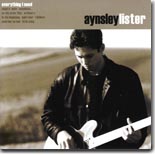 Though British musician Aynsley Lister classifies himself as a
blues musician, his music has absorbed several other styles over time, a
trademark of British Blues. His lyrics touch on blues themes, but are
also very catchy, as are his melodies, which sometimes venture toward
the rock side of blues as well as rhythm and blues. He is also a
first-rate vocalist and guitarist. These qualities have made Lister
quite a popular attraction in Europe, where he has released six very
well-received discs. Most recently, he appeared on the widely-acclaimed
Pilgrimage – From Mississippi to Memphis with fellow Europeans
Ian Parker and Erja Lyytinen.
Though British musician Aynsley Lister classifies himself as a
blues musician, his music has absorbed several other styles over time, a
trademark of British Blues. His lyrics touch on blues themes, but are
also very catchy, as are his melodies, which sometimes venture toward
the rock side of blues as well as rhythm and blues. He is also a
first-rate vocalist and guitarist. These qualities have made Lister
quite a popular attraction in Europe, where he has released six very
well-received discs. Most recently, he appeared on the widely-acclaimed
Pilgrimage – From Mississippi to Memphis with fellow Europeans
Ian Parker and Erja Lyytinen.
Ruf Records recently released Everything I Need for U.S.
consumption. Originally issued in Europe in 2001, this disc served as
Lister’s big break overseas. From the opening cut, the incredibly
appealing title track, it’s easy to see why it was. “Everything I Need”
rocks hard and Lister’s guitar work stands out. “Angel o’ Mine” is a
slower, more wistful track with an introspective guitar break.
“Soundman” has a guitar melody from the SRV School, and a cover of Tony
Joe White’s “As The Crow Flies” puts Lister’s acoustic chops on display.
“Without U” is another captivating track, as is “In The Beginning” and
“I Believe.” It wouldn’t be hard to imagine these tracks getting
extensive play on rock stations. “Quiet Boy!” is a jazzy instrumental
with some great fretwork by Lister, and “Need Her So Bad” is by far the
bluesiest track on the disc, a seven-minute epic of aching need that
borrows a bit from “Have You Ever Loved A Woman.”
The closing track is a masterful cover of Jimi Hendrix’s “Little Wing,”
that leads (after a two-minute break) into a bouncing untitled acoustic
track that you hate to hear come to an end.
Though only a three-piece unit at the time (Lister on guitar and vocals,
Wayne Proctor on drums, Matt Key on bass), they have a big sound.
Producer Jesse Davey enhances the sound by adding Hammond B-3 on a
couple of tracks.
Lister has a new disc coming out on Ruf soon. If you’re a blues-rock fan
and are not familiar with him, pick up this release (or Pilgrimage)
and experience it first-hand. Chances are you’ll be back for more.
--- Graham Clarke
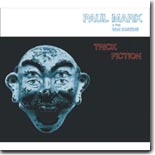 Paul Mark & The Van Dorens’ latest release on Radiation Records
is an edgy slice of American music. Recorded in Memphis at Ardent
Studios, Trick Fiction is roots rock with that deep soul vibe
that’s present in just about everything that comes from the Bluff City.
While the Van Dorens (James Strain – bass, Dan Schnapp – keyboards,
Joshua Wheeler – drums) play rough, ragged, and relentless music that
will get you on your feet, the real attraction is the wit and wisdom of
singer/guitarist Paul Mark, who definitely mines seldom-explored veins
with his original lyrics.
Paul Mark & The Van Dorens’ latest release on Radiation Records
is an edgy slice of American music. Recorded in Memphis at Ardent
Studios, Trick Fiction is roots rock with that deep soul vibe
that’s present in just about everything that comes from the Bluff City.
While the Van Dorens (James Strain – bass, Dan Schnapp – keyboards,
Joshua Wheeler – drums) play rough, ragged, and relentless music that
will get you on your feet, the real attraction is the wit and wisdom of
singer/guitarist Paul Mark, who definitely mines seldom-explored veins
with his original lyrics.
From the opening track, “Fritos, BBQ, & Scotch,” a hilarious tune about
roughing it while the little woman is out of town that’s bound to be a
crowd favorite, you know Trick Fiction is going to be something
different and exciting. “Big Glass Building” a swampy tune that would
put a smile on John Fogerty’s face, is a non-PC solution for today’s
environmental woes. Things settle down a bit with the album’s lone
cover, Doc Pomus and Mort Shuman’s haunting “Suspicion,” but “Never
Again” is a raving rocker that will please rock & rollers.
“Conspiracy” is a tongue-in-cheek study in paranoia, and “Fear of Grief”
features some exceptional guitar from Mark. One of the highlights of the
disc is “30 Lbs. in 30 Days,” a testimony to the perils of quick fixes.
“Wholly Rollin’” is another roof-raiser with some scorching slide by
Mark and keyboards by Schnapp. The pair also impresses on the tasty
instrumental “Stake Out,” which brings to mind those great Stax/Volt
instrumentals of the 60’s.
“Times Have Changed” is a jumping mid-tempo rocker, and “Small Heaven”
is a nice ballad featuring Mark on piano. The closer, “Riverside Diner,”
is a surreal rock & roller with references to Pomus, Big Joe Turner,
George W. Bush, and Jesus mixed in for good measure.
Trick Fiction is just what the doctor ordered for fans of roots
rock with a dash of Memphis R&B thrown in for good measure. Look for
this fine CD from Amazon,
www.cdbaby.com or
the band’s website,
www.PaulMark.com.
--- Graham Clarke
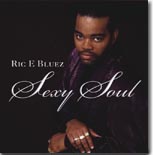 What
have we here? Sexy Soul (Betty Lowe Records), from Ric E Bluez,
is another fine new release with real musicians throughout. Perhaps the
repeated pleas to lose those synthesizers and drum machines haven't
fallen on deaf ears. Ric E Bluez was born on November 28, 1969 in
Mississippi and now resides in Houston. It's refreshing to hear a young
singer like Ric stay true to his roots and deliver us such a
professional album the first time out. It usually takes younger singers
a few albums to sort of hit their stride, find their niche so to speak,
but Ric seems to have done it with his first release. This is not to say
this release is old school. It has a modern updated sound, and with the
advent of internet radio and the many stations playing southern soul and
blues, there is a world out there waiting to hear these fine independent
releases.
What
have we here? Sexy Soul (Betty Lowe Records), from Ric E Bluez,
is another fine new release with real musicians throughout. Perhaps the
repeated pleas to lose those synthesizers and drum machines haven't
fallen on deaf ears. Ric E Bluez was born on November 28, 1969 in
Mississippi and now resides in Houston. It's refreshing to hear a young
singer like Ric stay true to his roots and deliver us such a
professional album the first time out. It usually takes younger singers
a few albums to sort of hit their stride, find their niche so to speak,
but Ric seems to have done it with his first release. This is not to say
this release is old school. It has a modern updated sound, and with the
advent of internet radio and the many stations playing southern soul and
blues, there is a world out there waiting to hear these fine independent
releases.
This CD opens with the song I was first turned on to, "Somebody's
Cheating." With heavy bass, tight horns and a very soulful guitar, this
song is crafted with a catchy hook that bounces around in your head long
after the song is over. That's what hits are made of.
The second track opens with some fine sax playing by Ronnie Allen and is
a mid-paced tune that is more suited to the smooth soul crowd than the
southern soul one. This is not meant as a negative observation, but
shows that Ric's music has to potential to reach several markets. A
great retro sounding "That's Why I Still Love You" pays its respect to
Sam Cooke and Bobby Womack, and treats us with some fine background
singing. There are also a few funky dance numbers like "Pink Panties"
and the southern sounding "Running Your Mouth."
There's a truly fine slow ballad, "If I Were You," that reminded me of
yesteryear, listening to the great Jerry Butler. It has that early '60s
feel to it. A great track and one to come back to over and over again.
Enough can't be said about the fine contributions of Herman Echols on
bass, Gerald Jackson on guitar and the versatile Marcus Mays on piano
and Hammond organ. Each contribute to a CD that has it all --- great
vocals, fine songwriting and expert musicianship throughout. Visit Ric's
website at
www.ric-e-bluez.com and check out his music and photos for yourself.
--- Alan Shutro
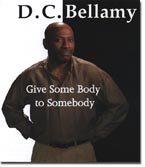 Another
winner here. This release, Give Some Body To Somebody, from
D.C. Bellamy, had so much going for it, I wasn't really surprised
since it was produced by Jim O'Neal (Living Blues) for his own
Stackhouse Records and recorded at Blue Heaven Studios, Salina, Kansas.
For those of you not familiar with Blue Heaven Studios, it is an old
church converted to an audiophile-quality recording studio several years
ago by Acoustic Sounds owner Chad Kassem. Each year in October they host
the "Blues Masters At The Crossroads" festival in Salina, Kansas. Prior
years have seen blues legends such as Honeyboy Edwards, Robert Lockwood
Jr., Hubert Sumlin and Billy Boy Arnold perform. I have been told that
it is a must attend festival, so perhaps next year........
Another
winner here. This release, Give Some Body To Somebody, from
D.C. Bellamy, had so much going for it, I wasn't really surprised
since it was produced by Jim O'Neal (Living Blues) for his own
Stackhouse Records and recorded at Blue Heaven Studios, Salina, Kansas.
For those of you not familiar with Blue Heaven Studios, it is an old
church converted to an audiophile-quality recording studio several years
ago by Acoustic Sounds owner Chad Kassem. Each year in October they host
the "Blues Masters At The Crossroads" festival in Salina, Kansas. Prior
years have seen blues legends such as Honeyboy Edwards, Robert Lockwood
Jr., Hubert Sumlin and Billy Boy Arnold perform. I have been told that
it is a must attend festival, so perhaps next year........
D.C. Bellamy has performed many years on the road with backup bands and
for a spell as bandleader for the great Betty Everett (you know...."(Shoop
Shoop) It's In His Kiss." This CD has eight fine original songs. The
titles hint at Bellamy's sense of humor, as "I.C.U. Saw Me," and the
title track, "Give Some Body To Somebody," are two fine examples. His
vocals and guitar playing are strong as is his songwriting. This is a
blues album with lots of life stories. D.C. is full of stories. He likes
to shock his audiences and then get them to laugh. He always wants to
get your attention in one way or the other.
"I just buried my wife," says D.C to the crowd. This gets the usual
sympathy he is looking for. Then he hits them with "I was acquitted."
He got the laughter and attention he was looking for. Other songs such
as "One's The Woman, One's The Wife" and "Bury The Bone" (by our own
Frank Ace) stay true to form with their humorous touches. Of the cover
songs, D.C. does a jaw dropping version of Billy Ray Charles' "There's A
Rat Loose In My House" which tops the original and lays to rest the
rather uninteresting Bobby "Blue" Bland version on his "Memphis Monday
Morning" CD.
Another cover, "Room With A View," unfortunately challenges Johnny
Adam's great version and falls a bit short there. Perhaps if we never
heard the original, it would register higher. There's also a fine cover
of J.B. Lenoir's "How Much More (How Long)." A hand for all the top
notch musicians, with a special one going out to John Paul Drum on
harmonica. His playing takes this album to another level.
In summation, this is a terrific release by a strong new (to me) artist,
and a recording to make any audiophile proud. Buy it, crank it up, and
smile.
--- Alan Shutro
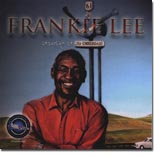 Standing
At The Crossroads (Blues Express) is only the fifth release in
Frankie Lee's long career and a reunion of sorts with
producer-songwriter Dennis Walker, who co-produced Frankie's The
Ladies & The Babies some 21 years ago for Hightone Records. The
reunion continues with Lee Spath, the drummer on that album and Robert
Cray band members Richard Cousins on bass and Jim Pugh on keyboards,
both of whom also appeared on that earlier album. Dennis Walker penned
eight of the tunes, partnering on some with Alan Mirikitani who also
contributes the great guitar playing we hear on this new release. There
are also two wonderful gospel tunes dating back to the golden age that
genre which enable Lee to use his gospel trained voice to it's most
emotive and expressive extremes.
Standing
At The Crossroads (Blues Express) is only the fifth release in
Frankie Lee's long career and a reunion of sorts with
producer-songwriter Dennis Walker, who co-produced Frankie's The
Ladies & The Babies some 21 years ago for Hightone Records. The
reunion continues with Lee Spath, the drummer on that album and Robert
Cray band members Richard Cousins on bass and Jim Pugh on keyboards,
both of whom also appeared on that earlier album. Dennis Walker penned
eight of the tunes, partnering on some with Alan Mirikitani who also
contributes the great guitar playing we hear on this new release. There
are also two wonderful gospel tunes dating back to the golden age that
genre which enable Lee to use his gospel trained voice to it's most
emotive and expressive extremes.
One of these, "Our Prayer For Peace," originally recorded by The Dixie
Hummingbirds at the height of the Civil Rights Movement, is particularly
poignant since Frankie lost a daughter in Afghanistan and a son in Iraq
on the very same day - December 26, 2003. "I thought this would be a
good song for me to do because this is what the world needs," he says.
Few singers have mixed blues and gospel on the same album since each is
at the opposite end of the music spectrum. Remember, it was blues that
was viewed by the gospel community as the devil's music. "They're the
same, just different lyrics," Lee states. "The feeling is the same, the
story's the same, the lyrics just change."
Of the remaining tracks, the opener, Walker's "I Wish I Had A Dime,"
with its great follow-up line "for every dollar I spend on you," starts
things off on an upbeat note. There's Johnnie Taylor's "I Need Lots Of
Love," done by J.T. in 1964 and given a great make over by Frankie 42
years later. The deep soul "Better Than That" is another Walker
standout, as is the soon to be classic "I Ain't Ever Had The Blues (Like
This Before)." The Lee-penned title track, "Standing At The Crossroads,"
is a straight blues burner that adds to the diversity of this fine
release. This is an album with the highest level of musicianship, not a
weak track, and a singer who seems to get better each time out. I can
give this release the highest recommendation.
Give the gift of Frankie Lee this holiday season and watch the happy
faces.
--- Alan Shutro
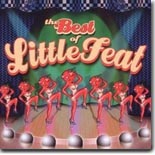 They
were never classified as a blues band, but the Little Feat
greatest hits anthology, The Best of Little Feat (Warner Brothers
/ Rhino), has enough blues-based material to appeal to a majority of the
Blues Bytes readers. This fine collection contains 17 cuts, covering the
period from their 1971 debut release, Little Feat, right up to
the late 1990s.
They
were never classified as a blues band, but the Little Feat
greatest hits anthology, The Best of Little Feat (Warner Brothers
/ Rhino), has enough blues-based material to appeal to a majority of the
Blues Bytes readers. This fine collection contains 17 cuts, covering the
period from their 1971 debut release, Little Feat, right up to
the late 1990s.
The transition of members joining and leaving the band is apparent in
the changing sound, most notably the funkier groove that came when
guitarist Paul Barrere, bassist Kenny Gradney and percussionist Sam
Clayton came aboard in time for the third album in 1973, Dixie
Chicken. Of course, the biggest change came when the band re-formed
in 1988, nine years after the death of leader Lowell George, first with
the vocals of former Pure Prairie League leader Craig Fuller and later
with the band's only female member, Shaun Murphy. The CD shows that
throughout all the changes, Little Feat's music remained top notch.
Many of the band's classics are here, and longtime Feat fanatics can
likely guess most of the titles: "Cold, Cold, Cold," "Tripe Face
Boogie," "Willin'," "Dixie Chicken," a live version of "Oh Atlanta"
(from Waiting For Columbus), "Hi Roller," "Time Loves A Hero," "Let It
Roll," and "Rad Gumbo," to name just a few of the cuts.
Was Little Feat the greatest rock 'n' roll band ever? In my humble
opinion, they are right up there with the best. The Best of Little
Feat will show you why. Pop it in your CD player and get ready to
'boogie your scruples away!'
--- Bill Mitchell
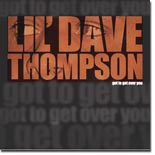 “This
may have more guitar solos than all our previous releases,” said label
president Andrew Galloway. However, they aren’t wearing because they are
not incessant. Lil’ Dave Thompson – best known for touring with
R.L. Burnside and Jr. Kimbrough – only solos for a purpose. On this
refreshing recording, Got To Get Over You (Electro-Fi), support
is provided by an all-star cast of Canadian blues musicians. The music
is pure blues, but soul/blues is also featured. Dave uses his guitar as
an extension of his voice, while the sidemen play as if they were raised
in Mississippi. Only one of the ten songs is a cover.
“This
may have more guitar solos than all our previous releases,” said label
president Andrew Galloway. However, they aren’t wearing because they are
not incessant. Lil’ Dave Thompson – best known for touring with
R.L. Burnside and Jr. Kimbrough – only solos for a purpose. On this
refreshing recording, Got To Get Over You (Electro-Fi), support
is provided by an all-star cast of Canadian blues musicians. The music
is pure blues, but soul/blues is also featured. Dave uses his guitar as
an extension of his voice, while the sidemen play as if they were raised
in Mississippi. Only one of the ten songs is a cover.
Thompson plays the most untainted blues guitar you’ll hear in
contemporary blues. He loves his guitar like a woman throughout the
disc. His affectionate but gruff voice – which sounds a bit like Carl
Weathersby – and remarkable guitar consistently connect to express
emotion and pain.
This is one of the best releases of 2006. The recipe for its success
includes Mississippi dirt, cigarette smoke, juke joint liquor, and a
touch of urbanity. Lil’ Dave Thompson defines blues for today by
infusing blues of yesterday.
--- Tim Holek
Sweet Banana Pie, from King Alex & the Untouchables, was
recorded in the Fall of 2004 at Blue Heaven Studio in Salina, Kansas. No
major blues labels were interested to release it so King Alex has
released it himself. He doesn’t possess an extensive voice and he tends
to talk/shout the lyrics. Yet, he can sincerely sing with the same
enthusiasm as B.B. King. Other B.B. similarities include the vocal
styling and song arrangements. King Alex’s songwriting reflects a
preference for traditional electric blues.
Overall, the ten songs are about good and bad love. At times, Littlejohn
energizes his band to an exciting level that is not consistently heard
on the CD. With weak lyrics, the soul/blues "Love Is So Good" is still a
highlight because the rhythm is memorable, the guitar plays a strong
hook, and the drums seem alive. Throughout, The Untouchables shine. Bart
Colliver is all over the organ/keyboard while Doug Hemphill’s swaggering
guitar is as polished as chrome.
King Alex performs a style of blues that is becoming extinct and
appreciated only by the hard core blues fan. They will love the great
band, good melodies, and the best real deal blues heard east of the
Mississippi River. King Alex plays blues like blues is supposed to be
played. Like he says, “Don’t you ever never ever never forget it.”
--- Tim Holek
Bernard Allison is an excellent live performer. A counterpart of
his told me that Bernard is so popular in Europe that he could tour
there non-stop. Then, it comes as no surprise this live CD, Energized
(Ruf Records), was recorded last year in Germany. Some will question why
Allison has released a live album so soon after 2003’s Kentucky Fried
Blues Live. The good news is the set mainly focuses on material from
his recent studio albums, so only one song is reprised from the previous
live disc. A bigger question is whether the new double CD has captured
Allison’s intense onstage energy.
Like a seasoned nightclub disc jockey, Allison segues from one song into
the next without any breaks. "Another Ride To The City" is performed
like a well-tested and lubricated road machine. The funky tune has lots
of kick and energy and showcases the proficient band. Allison growls the
vocals out on "It’s A Man Down There," which features excellent
keyboards and electrifying guitar. There are plenty of extended solos on
the first few songs. Initially, since they aren’t played at lightening
speed, they are enjoyable. Experiencing all the emotions produced by the
music and lyrics, you ride a musical roller coaster on "Bad Love."
However, the extended soloing now becomes draining. Later, on "Wah Wah
Action," the incessant solos seem pointless. "Too Many Women" is a mix
of R&B and funk, which formulates groovy contemporary blues. It features
a lengthy bass guitar solo after which the band ignites with Allison at
the helm.
"The Walk" contains rockin’ slide à la Bo Diddley. Andrew Thomas’
pounded drums drive the explosive attack of the guitar. This is one of
those songs that will surely attract a younger generation due to the
song’s aggressive, kick ass nature. When Allison lets rip on guitar,
it’s like he is speaking for his entire generation. Yet, it talks to
peoples of all ages. The sliding continues through "Step Down and
Talking Guitar" where segments of "Amazing Grace" and "When The Saints
Go Marching In" are performed as a tribute to the Hurricane
Katrina-ravished Gulf Coast of America. Since it is chart-topping
material, the pop-rocker "Snake Bit Again" should be released as a
single.
This is almost as good as experiencing Allison live in concert. Yes,
there is plenty of guitar, but there are also frantic rhythms, practical
grooves, and fiery solos from other band members. Mike Vlahakis’
keyboards are brilliant throughout. Allison’s earthy and authentic lead
vocals preside over 11 songs. He has one of the most funky contemporary
guitar sounds of all the young blues gunners. So many songs – like "A
Woman Named Trouble" – prove that point. Best of all, the Hendrix mimics
were either entirely omitted from the performance or they were edited
out. Bernard could also benefit from dropping some of his father’s songs
from the set. Singalong songs and drum solos never transition from the
concert hall to the living room well. Those items should have been left
off the CD, too. When Allison focuses on the melody, as opposed to the
guitar solo, he sets himself apart from his contemporaries. However, the
unlimited jams and five instrumentals might be too much for listeners to
sit through this entire 107-minute double CD. One thing I’ll say after
hearing this barn-burning CD and witnessing Allison on the same tour –
Bernard Allison rocks.
--- Tim Holek